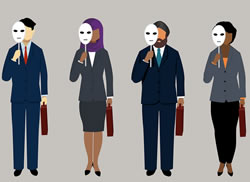Simi Rayat* uses an experience from her gym class to illustrate the importance of leaders acting as role models for their teams.
 Being a psychologist, I’m always curious to observe and understand why people behave as they do (in other words, I’m nosey).
Being a psychologist, I’m always curious to observe and understand why people behave as they do (in other words, I’m nosey).
Recently, I’ve noticed that many fellow gym goers have not always been wiping down their equipment at the end of a class unless one person at the front takes the lead and does it — then others seem to follow.
The gym instructor and I were talking about this and she said she was getting tired off reminding people to wipe down the equipment.
She said she had noticed it happening less and less over the past few months and felt people were becoming more complacent with COVID hygiene etiquette.
I suggested she put a sign at the front of the class and where the equipment stand is, which states the following:
‘Your fellow gym buddies always wipe down the equipment they use. Thank you for your support in keeping yourself and others safe too.’
Since the signs have gone up, the gym manager has noticed a 68 per cent increase in people wiping down their equipment.
My instructor has noticed an even higher percentage in our class, as she even reads out the statement at the end of the exercises.
It’s fascinating that we can shape and influence the actions of those around us when we use the ‘power of social norms’.
This is exactly what was behind my suggestion of putting up the signs with their exact wording.
Social norms are a way of thinking or behaving that is considered appropriate within a particular reference group and most members of that group adhere too.
People adhere as they want to belong to the group and be perceived in a favourable light.
Non-compliance can put them at risk of being rejected by the group they desire to be part off, or penalised through sanctions.
Increasingly, social norms are used to encourage pro-social behaviour.
They have been successfully used to encourage an increase in recycling, towel reuse, attendance at doctor appointments; to reduce long-term energy use, increase vaccination uptake and increase organ donor registrations, to mention a few.
The power of social norms highlights that we are persuaded by what others do, even when we don’t fully understand why they are doing it.
The desire to belong and be perceived positively takes over.
It also helps us to feel good about ourselves when we copy behaviour that others see as helpful and in service to others.
As a leader, it’s really important to be a role model for the behaviour you want to see.
Role modelling inclusive behaviours sets a precedent of the ‘standard of behaviour’.
It sets the social norms of etiquette and conduct in your team, of what is acceptable and not.
The key is to reinforce and reward pro-social behaviour that encourages inclusion, connection and belonging. Behaviour that is recognised and rewarded is repeated.
So recognise and reward inclusive behaviour such as empathy, collaboration, openness, curiosity, willingness to learn, speaking up and sharing views.
As a leader, when you recognise and reward this behaviour, you are signalling that inclusive behaviour is central to the conduct of the team.
You are showing that such behaviour will be welcomed, supported and encouraged.
Additionally, it’s super-important to call-out inappropriate behaviour, or behaviour that is not in line with the standards you aspire for your team.
By calling out those that cross this line, you can clearly express what is acceptable and not.
Each time this happens it reinforces the accepted standards within your team.
You can use the power of social norms to foster a more inclusive culture within your team.
Finally, remember this impactful statement by Former Chief of Army, Lieutenant General David Morrison: “The standard you walk past is the standard you accept.”
What actions will you take today to encourage inclusive behaviour in your team?
What actions will you take today to call out behaviour that is not in line with the standard you aspire for your team?
*Simi Rayat is a Melbourne psychologist and global leadership coach, specialising in inclusion, wellbeing and realising peak performance.
This article first appeared on LinkedIn.











